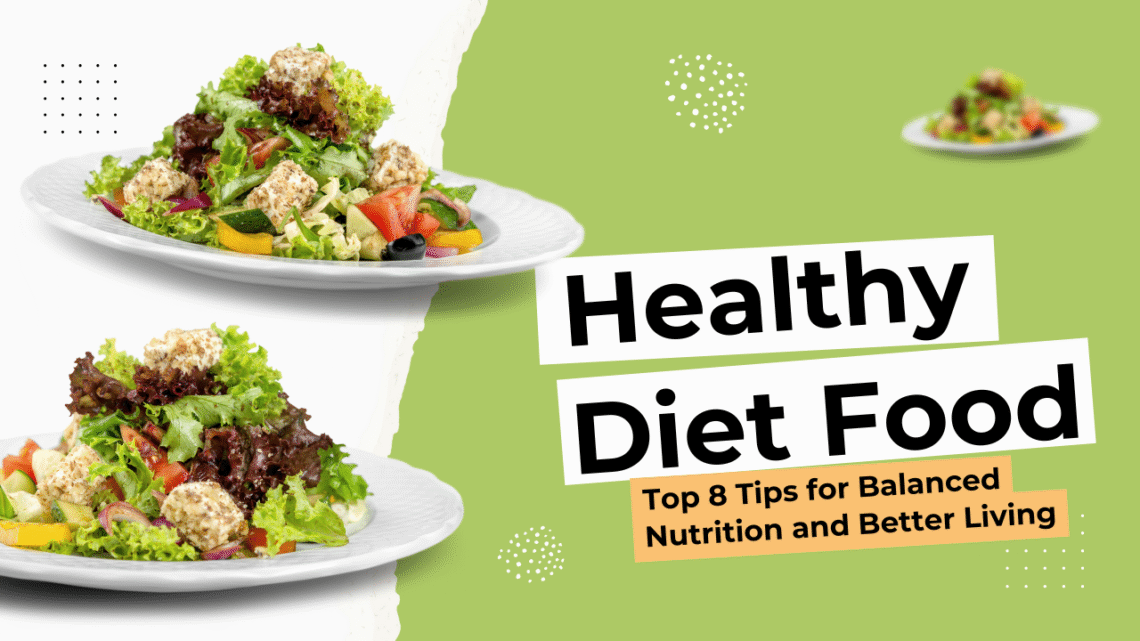A healthy diet is the foundation of a strong body, sharp mind, and long-lasting energy. In today’s fast-paced world filled with processed foods and quick fixes, making informed food choices is more important than ever. But what exactly is a healthy diet? And how can you adopt one that fits your lifestyle?
A healthy diet is more than just a meal plan—it’s a lifestyle that fuels your body, supports your mind, and promotes long-term well-being. In this comprehensive guide, we’ll dive deep into the core principles of a healthy diet, explore its many benefits, and share the top 8 expert-backed tips to help you make informed, lasting changes. Whether your goal is managing weight, boosting immunity, improving digestion, or simply feeling more energized every day, a well-balanced diet lays the foundation for success.
A healthy diet emphasizes whole foods like fruits, vegetables, whole grains, lean proteins, and healthy fats while limiting added sugars, processed items, and excess salt. It’s about balance, portion control, and consistency—ensuring your body gets the right fuel at the right time. The benefits go beyond physical health; eating well can sharpen mental clarity, stabilize moods, and reduce the risk of chronic diseases like diabetes and heart problems.
This guide is your starting point to reclaim control over your eating habits and adopt a healthier, more vibrant way of living. With the right knowledge and simple strategies, you can transition to a healthy diet that’s both enjoyable and sustainable for the long haul.
What Is a Healthy Diet?

A healthy diet is essential for maintaining energy, preventing disease, and promoting overall well-being. It provides your body with the vital nutrients it needs to function properly, including vitamins, minerals, proteins, carbohydrates, and healthy fats. These nutrients support critical processes such as metabolism, immunity, and cell repair, keeping your body strong and resilient.
What sets a healthy diet apart is not just what you include—but also what you limit. Excessive sugar, salt, saturated fats, and trans fats can increase the risk of obesity, diabetes, heart disease, and other chronic conditions. That’s why choosing nutrient-dense foods like colorful vegetables, whole fruits, lean proteins, whole grains, nuts, seeds, and healthy oils is key.
Balance, variety, and moderation are the pillars of a healthy eating plan. No single food can provide all the nutrients you need, so it’s important to eat a wide range of food groups in the right proportions. Moderation helps prevent overeating and keeps your calorie intake in check, while variety ensures you get all essential nutrients.
By focusing on whole, minimally processed foods and mindful eating habits, you can build a healthy diet that supports both short-term energy and long-term health.
A well-rounded diet includes:
- Fruits and vegetables
- Whole grains
- Lean proteins
- Healthy fats
- Plenty of water
A healthy eating pattern not only supports physical well-being but also enhances mental clarity, mood, and energy levels.
Benefits of a Healthy Diet

Before diving into the tips, it’s important to understand the real-life benefits of adopting a healthy diet:
- Weight control: Promotes healthy body weight and reduces obesity risk.
- Heart health: Lowers cholesterol and blood pressure, reducing the risk of heart disease.
- Diabetes prevention: Helps regulate blood sugar and improves insulin sensitivity.
- Better digestion: High-fiber foods keep your gut healthy and reduce bloating.
- Improved brain function: Essential fatty acids and antioxidants support brain health.
- Stronger immunity: Nutrient-rich foods enhance the body’s natural defenses.
- Longevity: Healthy eating habits reduce chronic disease risk and improve quality of life.
Top 8 Tips for a Healthy Diet
Here are the most effective and practical tips to help you adopt and maintain a healthy diet:
1. Eat More Whole Foods
Whole foods—like fresh fruits, vegetables, legumes, nuts, seeds, and whole grains—are nutrient-rich and free from additives or artificial ingredients.
Why it matters:
Whole foods are naturally rich in fiber, antioxidants, and essential nutrients that your body needs to function optimally. They also help control blood sugar and improve digestion.
Tip:
Shop the perimeter of the grocery store, where most fresh and whole foods are stocked.
2. Choose Lean Proteins
Protein is a cornerstone of a healthy diet, playing a critical role in building and repairing tissues, producing enzymes and hormones, boosting immunity, and keeping you full for longer periods. Including the right amount of high-quality protein in your daily meals helps maintain muscle mass, supports metabolism, and provides stable energy throughout the day.
For a truly healthy diet, focus on lean, nutrient-dense sources of protein such as:
- Skinless poultry (like chicken or turkey)
- Fatty fish (such as salmon, mackerel, or sardines) rich in omega-3s
- Eggs (a complete protein with essential amino acids)
- Legumes, including beans, lentils, and chickpeas
- Low-fat dairy products like yogurt, milk, and cheese
- Plant-based options such as tofu and tempeh, ideal for vegetarians and vegans
Why it matters:
Protein not only keeps you feeling satisfied but also plays a crucial role in healing, muscle repair, and immune support. It also aids in weight management by reducing cravings and promoting fullness.
Tip:
To maintain a healthy diet, aim to include a protein portion about the size of your palm at every meal. Combining protein with fiber-rich foods like vegetables or whole grains enhances nutrient absorption and digestion, making your meals more balanced and satisfying.
3. Focus on Healthy Fats
Not all fats are bad! Your body needs healthy fats to absorb nutrients, support brain health, and maintain hormone balance.
Best sources include:
- Avocados
- Olive oil
- Nuts and seeds
- Fatty fish
- Coconut (in moderation)
Avoid: Trans fats and excessive saturated fats found in fried foods, baked goods, and fast food.
Tip:
Use olive oil for cooking, snack on a handful of nuts, or add chia seeds to your smoothie.
4. Limit Added Sugars and Refined Carbs

Excess sugar and refined carbs (like white bread, pastries, and sugary drinks) spike blood sugar and promote fat storage.
Why it matters:
High sugar intake is linked to obesity, diabetes, heart disease, and mood disorders.
Tip:
Read food labels for hidden sugars (look for ingredients ending in “-ose”) and swap sugary snacks for fruit, yogurt, or whole grain options.
5. Fill Half Your Plate with Vegetables
Vegetables are low in calories and packed with vitamins, minerals, antioxidants, and fiber.
Best choices include:
- Leafy greens (spinach, kale)
- Cruciferous veggies (broccoli, cauliflower)
- Colorful options (bell peppers, carrots, beets)
Why it matters:
Vegetables reduce inflammation, aid digestion, and support immune health.
Tip:
Roast a big batch of mixed veggies for the week or add spinach to your smoothies and eggs.
6. Stay Hydrated
Water is essential for digestion, nutrient absorption, and toxin removal. Even mild dehydration can cause fatigue and concentration problems.
How much to drink:
Aim for 8–10 glasses (2–2.5 liters) per day. Increase if you exercise, sweat a lot, or live in a hot climate.
Tip:
Carry a water bottle, infuse your water with fruits or herbs, and limit sugary beverages.
7. Practice Portion Control
Eating the right portion sizes helps prevent overeating and supports healthy weight management.
Why it matters:
Oversized portions contribute to excessive calorie intake, even with healthy foods.
Tip:
Use smaller plates, chew slowly, stop eating when you’re 80% full, and avoid distractions like TV during meals.
8. Plan Your Meals Ahead

Planning your meals and snacks helps you stay on track and avoid last-minute unhealthy choices.
Why it matters:
Meal planning reduces stress, saves time and money, and ensures a balanced diet.
Tip:
Prepare a weekly menu, batch-cook meals, and keep healthy snacks like cut veggies or yogurt ready to go.
Healthy Diet Sample Meal Plan
Here’s a simple and realistic one-day healthy diet meal plan to help you get started on your journey toward better nutrition and wellness. It’s balanced, easy to prepare, and packed with essential nutrients to fuel your body all day long.
Breakfast:
Begin your day with a bowl of oatmeal topped with sliced banana, chia seeds, and a light drizzle of honey. Pair it with a cup of green tea or water to hydrate and boost your metabolism. This fiber-rich meal keeps you full and energized throughout the morning.
Morning Snack:
Enjoy a serving of Greek yogurt with mixed berries and a handful of almonds. This combination provides a great mix of protein, antioxidants, and healthy fats—ideal for maintaining stable blood sugar levels.
Lunch:
For lunch, have a grilled chicken breast with quinoa and roasted vegetables such as zucchini, bell peppers, and carrots. Add a side salad with a drizzle of olive oil and lemon for added freshness and nutrients.
Afternoon Snack:
Munch on carrot sticks and hummus. It’s a crunchy, satisfying snack high in fiber and protein.
Dinner:
Finish your day with a wholesome dinner of baked salmon, sweet potato mash, and steamed broccoli. A glass of water with lemon helps with digestion and hydration.
This one-day healthy diet plan supports energy, satiety, and overall health—perfect for building long-term habits.
Common Myths About Healthy Diets
Many people avoid starting a healthy diet due to common myths that are simply not true. Let’s break down four of the most widespread misconceptions and reveal the reality behind them.
Myth 1: Healthy food is bland.
Reality: A healthy diet doesn’t mean sacrificing flavor. By using fresh herbs, spices, citrus, garlic, ginger, and creative cooking methods like roasting, grilling, or stir-frying, you can create meals that are both nutritious and full of taste.
Myth 2: You must give up carbs or fat.
Reality: A well-rounded healthy diet includes all macronutrients—carbohydrates, protein, and fats—in the right proportions. Complex carbs like whole grains and healthy fats like nuts, seeds, and avocado are essential for energy, brain function, and nutrient absorption.
Myth 3: Eating healthy is expensive.
Reality: With a little planning, a healthy diet can be budget-friendly. Buying seasonal produce, cooking at home, and focusing on whole foods like legumes, grains, and vegetables can actually reduce grocery bills.
Myth 4: Skipping meals helps you lose weight.
Reality: Skipping meals can slow your metabolism and trigger binge eating later. A consistent, balanced healthy diet helps regulate hunger and supports sustainable weight management.
Understanding the truth empowers you to build lasting, realistic habits for lifelong wellness.
Tips for Eating Out While Staying Healthy
- When eating out, maintaining a healthy diet doesn’t have to be difficult. With a few smart choices, you can enjoy your meal while staying on track with your wellness goals. Start by choosing grilled, baked, or steamed dishes instead of fried or heavily processed options. These cooking methods preserve nutrients and reduce unhealthy fats, making them better for your overall healthy diet.
- Always ask for dressings and sauces on the side. This gives you control over how much you use and helps cut back on added sugars, salts, and calories. Another simple tip is to swap fries or fried sides for a fresh salad or steamed vegetables. These options add fiber and vitamins to your meal and keep you feeling full longer.
- Beverage choices are just as important. Skip sugary sodas and sweetened drinks. Instead, opt for water, lemon water, or unsweetened beverages, which support hydration and digestion.
- Lastly, practice mindful eating. Eat slowly, savor each bite, and listen to your body’s hunger and fullness cues. Enjoying your food without rushing helps prevent overeating and enhances satisfaction.
- Making these small but impactful decisions helps you maintain a healthy diet even when dining out, supporting your long-term health goals.
Long-Term Habits for Lasting Success
- A healthy diet isn’t a temporary solution—it’s a lifelong commitment to nourishing your body and mind. Instead of chasing quick fixes or restrictive fads, focus on building sustainable habits that support long-term well-being. One of the most important aspects of maintaining a healthy diet is consistency, and that comes from adopting a mindful and balanced approach.
- Start by eating mindfully—pay attention to what you’re eating, savor each bite, and avoid distractions like screens during meals. Tuning into your hunger cues helps prevent overeating and builds a healthier relationship with food. Eat when you’re hungry and stop when you’re comfortably full.
- Celebrate small victories along the way. Progress—not perfection—is the real goal of a healthy diet. Whether it’s adding an extra serving of vegetables or cooking more meals at home, every positive step counts.
- On tough days, be gentle with yourself. Everyone has off moments, and one meal doesn’t define your overall health. What matters most is getting back on track with kindness and determination.
- By embracing these principles and prioritizing balance, self-awareness, and self-compassion, you can make a healthy diet a natural and enjoyable part of your lifestyle—for life.
Conclusion: Your Health Starts with Your Plate

Adopting a healthy diet doesn’t have to feel overwhelming or restrictive. In fact, small, consistent steps are often the most effective way to create lasting change. By embracing the top 8 tips for a healthy diet, you can steadily improve your eating habits, boost your energy levels, support better digestion, and reduce the risk of chronic illness. The goal isn’t perfection—it’s progress.
A healthy diet is all about nourishment, balance, and sustainability. Instead of focusing on what you can’t eat, shift your mindset to the wide variety of wholesome foods you can enjoy—fruits, vegetables, whole grains, lean proteins, and healthy fats. These foods not only fuel your body but also enhance your mental clarity and mood.
It’s important to remember that there’s no universal blueprint for eating well. Every body is different. Listen to your body, notice how different foods make you feel, and personalize your eating habits accordingly. Whether you’re aiming to lose weight, manage a health condition, or simply feel your best, a healthy diet can help you thrive.
Make mindful choices, enjoy your meals, and take pride in building a lifestyle that supports long-term wellness—one bite at a time.
.Here are 5 Frequently Asked Questions (FAQ) about a healthy diet:
1. What is a healthy diet?
A healthy diet is one that includes a variety of nutrient-dense foods from all major food groups—vegetables, fruits, whole grains, lean proteins, and healthy fats—while limiting processed foods, added sugars, excessive salt, and trans fats. The goal is to nourish your body, support energy levels, and reduce the risk of chronic diseases.
2. How can I start eating healthier without feeling deprived?
Start small. Swap sugary drinks for water, choose whole grains over refined ones, and include a serving of vegetables with each meal. A healthy diet isn’t about cutting out everything you enjoy—it’s about balance and moderation.
3. Is it okay to have cheat days?
Yes, occasional indulgences are fine. A healthy diet is sustainable and allows for flexibility. Enjoying treats occasionally can help you stick to your goals long-term without feeling restricted.
4. Do I need to count calories on a healthy diet?
Not necessarily. Focus more on quality than quantity. Eating whole, unprocessed foods naturally helps regulate hunger and calorie intake.
5. Can a healthy diet help with weight loss?
Absolutely. A healthy diet, combined with regular physical activity, can support gradual, sustainable weight loss while improving your overall well-being.





